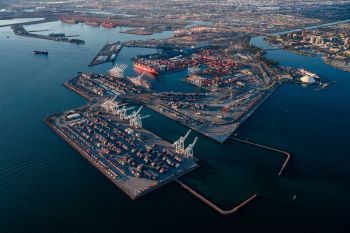The Port of Long Beach achieved its busiest month and its second-best quarter on record as consumers continued to practice physical distancing guidelines in March and turned their computers into virtual shopping malls.

Although March is traditionally one of the slowest months on the shipping calendar, dockworkers and terminal operators moved 840,387 twenty-foot equivalent units last month, a 62.3% jump from March 2020 and marking the largest year-over-year increase for a single month at the Port.
Imports rose 74% to 408,172 TEUs, while exports declined 3.9% to 139,710 TEUs compared to March 2020, when the economic effects of COVID-19 led to canceled sailings and fewer cargo shipments processed through Long Beach. Empty containers moved through the Port were up 112.5% to 292,505 TEUs.
“Although the pandemic is receding, consumers are spending less on travel this year and turning toward online retail in unprecedented numbers to purchase exercise equipment, office furniture and home improvement items,” said Mario Cordero, Executive Director of the Port of Long Beach. “The demand for e-commerce is happening more quickly than we anticipated, but we will continue to collaborate with our industry stakeholders to catch up with the unprecedented cargo volume at our gateway.”
“We’re pleased that many of our essential workers on the waterfront have been able to receive their COVID-19 vaccines to keep them healthy and to maintain the flow of cargo,” said Long Beach Harbor Commission President Frank Colonna. “Even as we set records, the economy is still in recovery mode, so it is vital to keep our supply chain workforce strong.”
March’s numbers mark the ninth consecutive month that the Port of Long Beach has broken cargo movement records for a particular month amid a historic cargo surge that started in July 2020.
The Port has moved 2,376,128 TEUs during the first quarter of 2021, a 41.2% increase from the same period in 2020. It was also the Port’s best first quarter on record, breaking the previous record set during the first three months of 2018 by 481,251 TEUs, and its second-best quarter overall, behind the fourth quarter of 2020.









